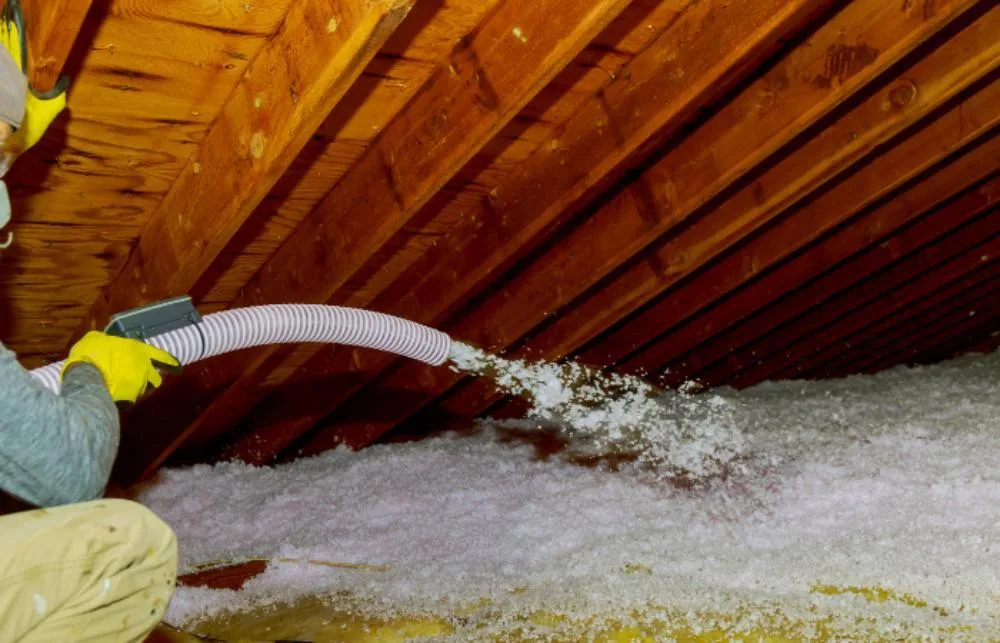Waterproofing describes a material or product’s capability to resist water penetration and prevent it from being affected or damaged by water exposure. Waterproofing is commonly used in various applications, such as clothing, outdoor gear, buildings, and even electronic devices, to protect them from the adverse effects of moisture. The goal of waterproofing is to enhance durability, avoid water damage, and preserve the integrity of the protected items or surfaces.
It’s essential to understand the effectiveness if is spray foam waterproof, especially if you’re thinking about using it for insulation. By delving into this aspect, you will gain valuable insights that guide you in making smart decisions for creating well-protected and insulated spaces.
Two Types of Spray Foam Insulation
These primary types of spray foam insulation are designed to address various needs and applications. Let’s delve into the details of open-cell and closed-cell spray foam so you can make an informed decision based on your specific requirements.
- Open Cell Spray Foam
This spray foam is a type of insulation known for its flexibility and softness. Its unique structure allows air to fill the open spaces in the material, making it lightweight and breathable. Upon application, it expands to fill gaps and conforms to surfaces. While it provides good insulation, it’s a bit softer and has a slightly lower insulation value compared to closed-cell foam.
- Closed Cell Spray Foam
Closed-cell spray foam insulation is a durable and rigid type of insulation characterized by a cellular structure where the foam cells are completely enclosed and tightly packed. Unlike open-cell foam, it doesn’t allow air to fill the spaces within the material, resulting in a more solid and robust structure. With a higher density, closed-cell foam provides effective insulation and serves as a strong moisture barrier, preventing the penetration of water.
Is Spray Foam Waterproof?
Yes, spray foam insulation is frequently commended for its exceptional waterproofing properties. When properly applied, spray foam creates a seamless barrier that helps prevent water infiltration. However, it’s crucial to understand that not all spray foams are created equal, and the effectiveness of waterproofing can depend on factors like application technique, thickness, and the specific type of spray foam used.
Debunking Common Concerns and Misconceptions
When it comes to waterproofing and construction in general, there are common concerns and misconceptions that people often have. Addressing these can lead to better-informed decisions and effective building practices. Here are some of these concerns and misconceptions related to spray foam:
- Installation Concerns
One common misconception is that installing spray foam insulation is easy as a DIY project. In reality, proper installation requires skill and experience. Hiring a professional installer is essential to make sure the foam is applied correctly and effectively.
- Cost Considerations
While spray foam insulation may have a higher upfront cost compared to traditional insulation methods, it often proves cost-effective in the long run due to its superior insulation properties and energy efficiency. Homeowners should look beyond initial expenses and consider the long-term benefits.
- Health and Safety
Some individuals worry about the health and safety implications of spray foam insulation, especially during the installation process. It’s important to use certified installers who follow safety guidelines. Once cured, properly installed spray foam is inert and safe, but precautions should be taken during application.
- Moisture Concerns
While spray foam insulation is excellent at preventing air infiltration, improper installation can lead to moisture-related issues. It’s crucial to address any leaks or moisture problems before installing spray foam to prevent trapping moisture in the walls that can lead to mold and other issues.
- R-Value Stability
Some misconceptions revolve around the stability of spray foam insulation’s R-value over time. When installed correctly, spray foam insulation maintains its R-value and effectiveness for the life of the building. Proper installation is key for maintaining long-term performance.
- Compatibility with Roofing Materials
In some cases, concerns arise about the compatibility of spray foam insulation with certain roofing materials. It’s essential to seek advice from roofing professionals to ensure compatibility and prevent any possible issues with specific roofing systems.
Benefits of Waterproof Spray Foam Insulation

With its multitude of benefits, waterproof spray foam insulation is a preferred choice for both residential and commercial uses. Here are some key advantages of using this type of insulation:
- Water Resistance
The primary benefit is, of course, its exceptional waterproofing properties. Closed-cell spray foam insulation, in particular, creates a seamless and impermeable barrier that prevents water and moisture infiltration. This is crucial for protecting buildings from water damage, mold growth, and other related issues.
- Energy Efficiency
Waterproof spray foam insulation provides excellent thermal insulation, and it reduces energy consumption and utility bills. It creates an airtight seal that minimizes heat transfer, keeping indoor spaces warmer in winter and cooler in summer.
- Durability and Longevity
Properly installed waterproof spray foam insulation can last for several decades without significant deterioration. Its durability makes it a long-term investment that requires minimal maintenance compared to traditional insulation materials.
- Structural Support
Closed-cell spray foam insulation has a rigid composition, adding structural strength to walls and roofs. This can contribute to the overall stability and durability of a building. It can be especially beneficial in areas prone to extreme weather conditions.
- Sound Insulation
In addition to its thermal insulation properties, waterproof spray foam also provides effective sound insulation. It can reduce noise transmission from outside sources, establishing a quieter and more comfortable indoor setting.
- Improved Indoor Air Quality
By preventing water intrusion and mold growth, waterproof spray foam contributes to better indoor air quality. The release of harmful spores into the air by mold and mildew can result in respiratory issues. The moisture resistance of spray foam helps maintain a healthier living or working environment.
- Quick Installation
While professional installation is crucial, the application of spray foam insulation is generally faster compared to traditional insulation methods. This can reduce labor costs and minimize disruption during the construction or renovation process.
Additional Tips for Waterproofing
In addition to using waterproof spray foam insulation, there are several other tips and practices that can further enhance the waterproofing of buildings. Here are some additional tips:
- Proper Site Grading
Ensure that the ground around the building is properly graded away from the foundation. This prevents water from pooling around the structure and reduces the risk of water infiltrating the basement or crawl space.
- Effective Drainage Systems
Install and maintain a functional drainage system, including gutters, downspouts, and French drains. Clear gutters regularly to prevent clogs that can lead to water overflow. Downspouts should direct water away from the foundation, and French drains can help manage water around the perimeter.
- Foundation Waterproofing
Apply a waterproofing membrane or coating to the exterior of the foundation walls. An additional layer of protection can prevent water penetration through the foundation, especially in areas prone to heavy rainfall or high water tables.
- Sealant for Cracks and Joints
Inspect and seal any cracks or gaps regularly in the building’s exterior, including around windows, doors, and foundation joints. Use an appropriate sealant to prevent water intrusion and air leaks.
- Landscaping Considerations
Be mindful of the landscaping around the building. Avoid planting large trees too close to the structure, as their roots can potentially compromise the foundation. Consider using permeable surfaces for walkways and driveways to allow water to absorb into the ground.
- Ventilation
Maintain adequate ventilation in attics and crawl spaces to prevent condensation and moisture buildup. Adequate ventilation helps maintain a drier environment and reduces the risk of mold growth.
Is Spray Foam Waterproof FAQs
What happens when spray foam gets wet?
When spray foam gets wet, its performance can be compromised, especially if it’s an open-cell foam. Open-cell foam can absorb water, leading to reduced insulation effectiveness and potential structural issues. Closed-cell spray foam is more water-resistant, but it’s crucial to address the origin of moisture to prevent long-term damage.
Can you use spray foam in the rain?
It is not recommended to apply spray foam insulation in the rain. Moisture can interfere with the curing process, affecting the foam’s properties and adhesion. Ideally, application should occur in dry conditions to ensure proper expansion, adhesion, and insulation performance.
What kind of foam is waterproof?
Closed-cell spray foam is generally more waterproof compared to open-cell foam. Closed-cell foam has a denser structure that prevents water absorption, making it an effective choice for applications requiring water resistance. It’s essential to note that while closed-cell foam is water-resistant, no foam insulation is entirely waterproof.
Is spray foam a water barrier?
Spray foam, especially closed-cell formulations, can act as an effective water barrier when properly applied. The foam’s ability to fill gaps and create an airtight seal helps prevent water infiltration. However, achieving a comprehensive water barrier involves addressing other aspects of construction, such as proper flashing, drainage systems, and foundation waterproofing.
Can water penetrate expanding foam?
Open-cell spray foam is more permeable and can absorb water, potentially leading to reduced insulation performance and the risk of mold growth. Closed-cell spray foam is less absorbent, making it more resistant to water penetration. Water can still find its way through gaps or cracks in improperly installed foam.
Is expanding foam good for waterproofing?
Expanding foam, particularly closed-cell spray foam, can be effective for waterproofing when applied correctly. It forms a seamless and continuous barrier that helps prevent water infiltration, making it suitable for various applications such as roofs, walls, and foundations.
Conclusion
Understanding the waterproofing capabilities of spray foam insulation is vital for informed construction decisions. With its benefits in water resistance, energy efficiency, durability, and quick installation, waterproof spray foam proves to be a preferred choice for creating well-protected and insulated residential and commercial spaces. Opting for closed-cell spray foam, with its dense structure providing robust water resistance, proves advantageous, especially in moisture-prone areas.
Tropic Air Conditioning is here to make sure you get the best waterproofing and insulation solution. Our team addresses all your worries by applying advanced insulation technology to fortify your home or business against water issues and enhance energy efficiency. Reach out to us today for reliable service.




